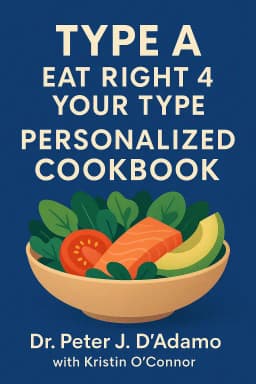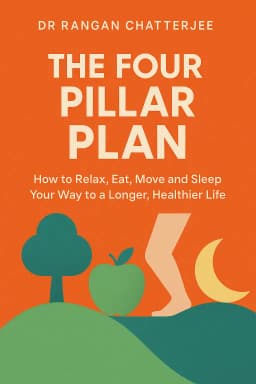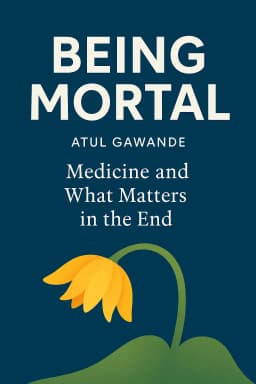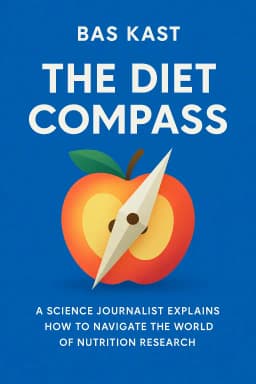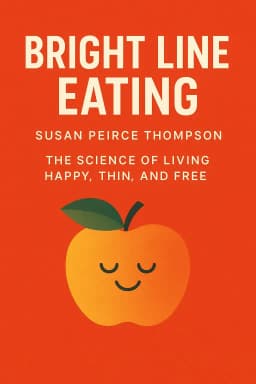
The Willpower Lie
The Science of Living Happy, Thin, and Free
Golden Hook & Introduction
SECTION
Laura: A study found that after a long day, judges were more likely to deny parole. Why? Their brains were low on glucose. It turns out your willpower for dieting might have more to do with your last meal than your moral character. Sophia: Wow, that is terrifying and also makes so much sense. That’s my 4 PM brain right there, the one that decides a handful of chocolate chips is a perfectly reasonable pre-dinner snack. It’s not a moral failing, it’s a glucose failing! Laura: Exactly. And that’s the mind-bending world we're diving into today with Bright Line Eating: The Science of Living Happy, Thin, and Free by Susan Peirce Thompson. Sophia: And Thompson isn't just a diet guru. She's a Ph.D. in Brain and Cognitive Sciences and a tenured professor. What's fascinating is that her whole approach is born from her own intense personal battle, first with drug addiction and then with food addiction, which makes this deeply personal and scientifically rigorous at the same time. Laura: It’s that combination that makes this book so compelling. She lived the problem and then used her scientific training to deconstruct it. She argues that for many of us, the battle with food isn't about a lack of willpower. It's about a brain that's been hijacked. Sophia: A hijacked brain. That’s a bold claim. I feel like we blame everything on willpower. If you fail a diet, it’s because you weren’t strong enough. But you’re saying the game is rigged from the start? Laura: That's precisely the argument. The book calls it the "Willpower Gap." And there’s a classic psychology experiment that illustrates this perfectly.
The Brain on Trial: Why Willpower Isn't Enough
SECTION
Sophia: Okay, I’m ready. Hit me with the science. Laura: It’s called the Radish Experiment. Researchers brought in a group of hungry college students who had been asked to fast. They walk into a lab that smells of fresh-baked chocolate chip cookies. On a table, there are two bowls: one filled with the warm, gooey cookies, and the other with… radishes. Sophia: Oh, the cruelty! That is just evil. Laura: Pure evil. The first group of students was told, "Your task is to eat the radishes. Do not touch the cookies." The second group was told, "Go ahead, eat the cookies." A third control group had no food at all. After 15 minutes of this torture for the radish group, they were all taken to another room and given a set of impossible geometry puzzles to solve. The researchers wanted to see how long they’d persist. Sophia: Let me guess. The radish-eaters, having already flexed their self-control muscle, were exhausted. Laura: Completely. The cookie-eaters and the control group worked on the puzzles for an average of about 19 minutes before giving up. The poor radish-eaters? They lasted only eight minutes. Sophia: That’s incredible! So resisting the cookies literally drained their brainpower for something else? It’s like a battery. Laura: Exactly. Willpower is a finite resource. It’s not a character trait; it’s a brain function that gets depleted. Every decision you make, every temptation you resist, from ignoring a text message to choosing a salad over a burger, drains that battery. By the end of the day, your willpower is shot. Sophia: And that’s when the "Saboteur" comes out to play. That little voice in my head that says, "You had a hard day. You deserve this pint of ice cream." Laura: That’s the one. Thompson argues that voice isn't really you. It’s the voice of your primitive brain. Your brain stem, which is screaming for fuel because its leptin signals—the "I'm full" hormone—are being blocked by our modern diet. And it’s the voice of your nucleus accumbens, the reward center, which has had its dopamine receptors so hammered by sugar and flour that it’s desperate for another hit just to feel normal. Sophia: So it’s not a psychological saboteur, it’s a biological one. It's my own brain chemistry whispering sweet nothings about cake. Laura: Precisely. And the most devious part is what the book calls the "Left Hemisphere Interpreter." There's this part of our brain whose only job is to create a story to make sense of our actions. So when your depleted, hijacked brain makes you eat the cake, your Left Hemisphere Interpreter immediately jumps in and says, "Oh, I'm eating this because it's my friend's birthday and it would be rude not to." It creates a perfectly logical reason for a completely biological impulse. Sophia: It’s a conspiracy inside my own skull! I’m being framed by my own brain. That’s both terrifying and, honestly, a little bit of a relief. It reframes failure. Laura: It does. The book argues that we form our self-image by observing our own behavior. So if you see yourself constantly breaking your promises about food, you conclude, "I am weak. I have no discipline." You don't conclude, "My brain's leptin signaling is faulty." Sophia: Okay, so if our brains are rigged against us and willpower is a joke, what's the solution? Just surrender to the cookie? Laura: This is where the book gets really radical, and frankly, very controversial. The solution proposed isn't about moderation or trying harder. It's about drawing lines in the sand so bright and so clear that you never have to use willpower again.
The Four Bright Lines: A Radical, Non-Negotiable Solution
SECTION
Sophia: Alright, I’m intrigued and a little scared. What are these "Bright Lines"? Laura: There are four of them, and they are non-negotiable. One: No Sugar. Two: No Flour. Three: Eat three meals a day, no grazing. Four: Weigh and measure your food. Sophia: Hold on. No sugar, no flour... ever? That sounds less like freedom and more like a prison. That means no bread, no pasta, no birthday cake. Critics have called this approach a potential trigger for disordered eating. How is this not just swapping one obsession for another? Laura: That is the central critique, and the book tackles it head-on. The argument is that for certain people, sugar and flour are not foods. They are drugs. Thompson uses the analogy of cocaine. Cocaine is a highly refined substance derived from a natural coca leaf. Heroin is a refined substance from a poppy. And what are sugar and flour? They are hyper-palatable, highly refined substances from sugarcane and grains. They hit our brain's reward system in a way it was never designed to handle. Sophia: So you’re saying a slice of bread is basically a drug? That feels like a stretch. Laura: For some brains, yes. The book introduces something called the "Susceptibility Scale," from 1 to 10. A "1" is someone like Brad Pitt, who on Oprah said food wasn't really on his radar. He can eat a brownie and walk away. A "10" is someone whose brain, upon tasting sugar, lights up like a pinball machine and screams "MORE!" For that person, the author argues, moderation is a lie. It's like telling an alcoholic to just have "one beer." Sophia: I see. So the Bright Lines are for the "10s" on the scale. It's an addiction model, not a diet model. Laura: Exactly. And that's why the rules have to be absolute. The "no grazing" rule, for example, is designed to heal leptin resistance. When you're constantly eating, your insulin levels are always elevated, which blocks the leptin signal from reaching your brain. Your brain literally thinks you're starving, even if you've just eaten. By sticking to three distinct meals, you give your hormones a chance to reset. Sophia: And the weighing and measuring? That’s the part that feels the most clinical and, well, obsessive. Laura: The book presents it as the opposite—as a source of freedom. It removes the guesswork. You don't have to stand in front of the fridge wondering, "Is this too much? Is this enough?" The decision is already made. You weigh your portion, you eat it, and you move on with your life. It silences the food chatter. For someone who has spent decades agonizing over every bite, that can be incredibly liberating. Sophia: I can see the logic, but it’s a hard pill to swallow. The idea of giving up bread forever is... bleak. Does it ever get easier? Laura: The book is very clear on this. The first few weeks are tough. Your brain is going through withdrawal. But as your dopamine receptors heal and your insulin stabilizes, the cravings genuinely disappear. The case studies in the book are powerful. People like Dennis Fansler, who struggled for 35 years, lost over 35 pounds in 70 days and said the biggest change was that he could finally think about something other than food. Sophia: That's the "Free" part of "Happy, Thin, and Free." Freedom from the mental obsession. Laura: That's the promise. But the book makes it very clear that the four rules, the food plan, are just the beginning. They're the foundation. To actually build a life on that foundation, you need a whole new operating system.
Living Happy, Thin, and Free: The System Beyond the Food
SECTION
Sophia: A whole new operating system? What does that even mean? It sounds like a lot of work on top of already giving up cake forever. Laura: It is, but the argument is that this is what makes it sustainable. The book details a set of "tools" that are just as important as the food rules. Things like a non-negotiable morning routine. Before you even check your phone, you make your bed, you do some inspirational reading, and you meditate. Sophia: Meditate? How does meditating help you not eat a doughnut? Laura: It replenishes your willpower. Remember the radish experiment? Meditation is like plugging your brain back into the charger. Studies show even five minutes can restore depleted self-control. It creates a buffer. It also helps you learn to sit with uncomfortable feelings, like cravings, without having to act on them. Sophia: Okay, that makes sense. What other tools are in this "operating system"? Laura: A huge one is committing your food for the next day, the night before. You write it down, you say it out loud to a buddy, or you post it in a support group. Once that commitment is made, it's locked in. The next day, you don't make a single food decision. You just execute the plan. It takes willpower out of the equation. Sophia: So you're front-loading the hard work to a time when your willpower is high, like the evening, so you don't have to rely on it when you're stressed and hungry the next day. Laura: Exactly. And then there's the most counter-intuitive tool of all, especially for a weight-loss plan. Sophia: Let me guess, it involves eating more cake? Laura: Not quite. The book strongly advises you not to start a new exercise program when you begin Bright Line Eating. Sophia: Wait, what? No exercise? Every other diet plan on earth screams "move more!" Why would you tell people not to? Laura: Because starting a new, strenuous exercise routine depletes the exact same willpower battery you need to build your new eating habits. Weight loss, the book argues, is 80-90% about what you eat. The most critical task in the beginning is to make the four Bright Lines automatic. Once they are so ingrained they feel like brushing your teeth, then you can add exercise. Trying to do both at once is, for most people, a recipe for failure. You'll burn out your willpower and give up on everything. Sophia: That is... completely backwards and also makes perfect sense. You're protecting your most limited resource for the most important job. Laura: It's about being strategic. The goal is to make the behaviors so automatic that they shift from your prefrontal cortex—the decision-making part of your brain—to your basal ganglia, the habit center. Just like you don't "decide" to brush your teeth, you just do it. The goal is to get to a place where you just eat this way, without thinking, without struggle. Sophia: So the rules aren't the prison. The automaticity they create is the freedom. Laura: That's the core idea. The structure is what liberates you from the constant, exhausting battle with your own brain.
Synthesis & Takeaways
SECTION
Sophia: So when we strip it all down, what is the one big idea we should walk away with from Bright Line Eating? Laura: It’s that for a certain portion of the population, the battle over food isn't a psychological flaw, it's a biological mismatch. Our ancient brains are not equipped for the modern food environment, which is a minefield of addictive, refined substances. The book's ultimate message is that freedom doesn't come from 'trying harder' or from moderation, which for some is a neurological impossibility. It comes from creating a structure so strong, so clear, and so automatic that trying is no longer necessary. Sophia: It’s a pretty radical re-framing of the entire diet and wellness industry. It’s not about finding the "perfect" diet, but about finding the right operating system for your specific brain. Laura: And acknowledging that what works for a "1" on the susceptibility scale will be a disaster for a "10." It’s about personalizing the approach based on neuroscience, not just calories. The book has been praised for this scientific rigor but also, as we discussed, criticized for its rigidity. It's a polarizing idea. Sophia: It really makes you question your own relationship with food. Are you just making choices, or is your brain making them for you? A question worth pondering. Laura: A question that might just change everything. Sophia: This is Aibrary, signing off.
